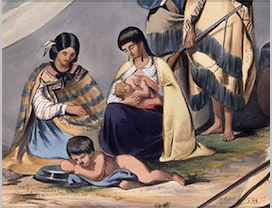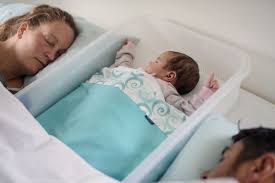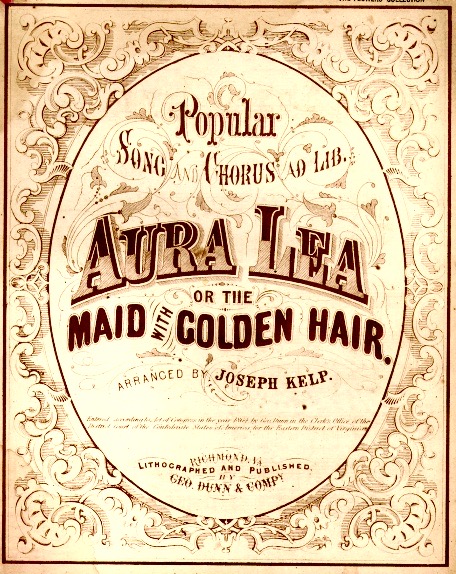|
This
oriori was produced in 2013 by the Whakawhetu
organization, to help reduce the sudden unexpected deaths of
infants (SUDI) among Maori whanau.
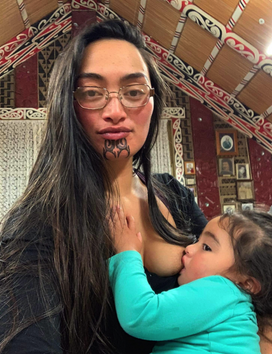
Peacefully
breastfeeding while traveling in 1849.
In
the hungry years of land
confiscation, mothering was an act of heroism.
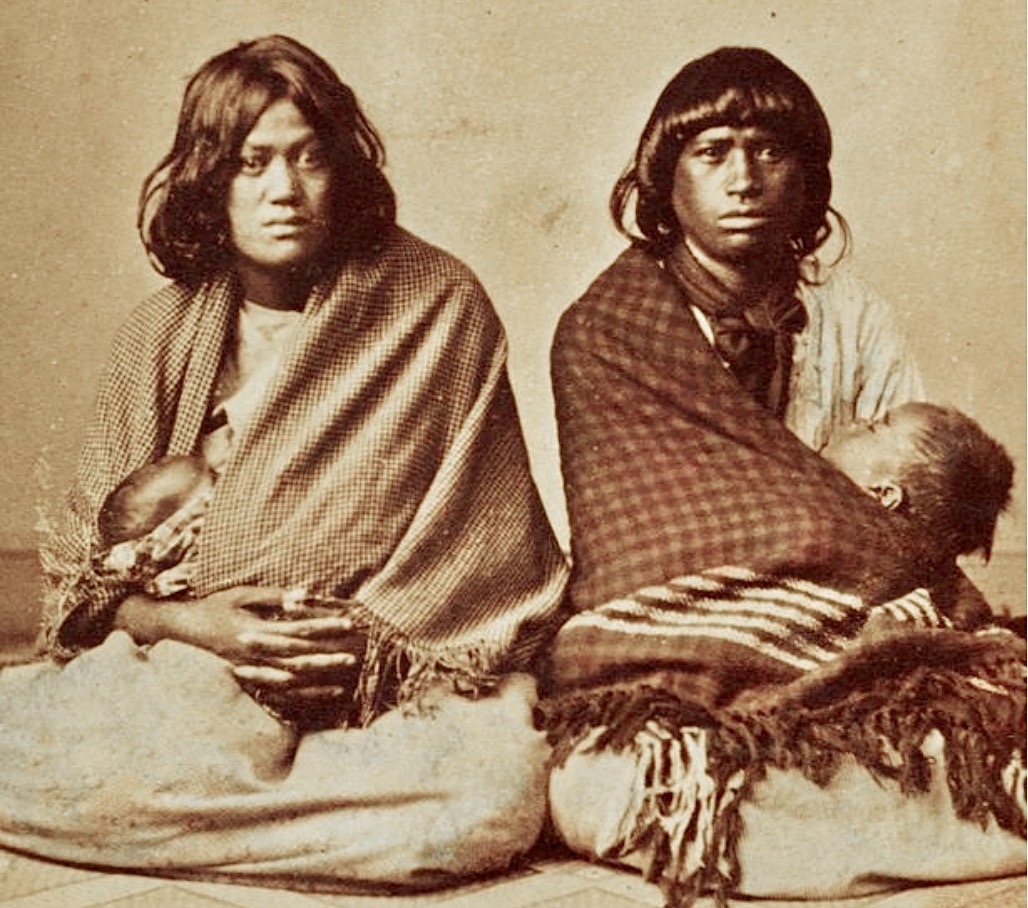 photo
1860s
|
Keep pepe safe while asleepPosition pepe flat on their back to sleep.Encourage and support breastfeeding. Place pepe in his or her own baby bed. Eliminate smoking in & after pregnancy. |
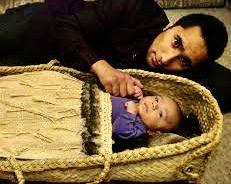
Reducing unexpected deaths of Maori infants
Keep in contact with the Māori
community and make use of their knowledge and tikanga. This
will help prevent the unexpected death of your pepe.
A 2022 study, Growing Up in New Zealand, found that found mothers with a greater connection to te ao Māori were more likely to breastfeed their babies for the recommended six months.
The study found that connections to te ao Māori, knowledge of the benefits of breastfeeding, how mothers felt about returning to work, and incidences of maternal depression during pregnancy were all factors that influenced breastfeeding.
Dr Denise Bennett, a paediatrician and māmā, says the study was instrumental in making breastfeeding a normal thing to do.
Breast-feeding
Traditionally, breastfeeding was
what all mothers did. But a mixture of colonial puritanism,
international influences and rigid Plunket regulations have
impacted Māori women who are breastfeeding today.
In 1939, almost all mothers were breastfeeding when they were first visited by a Plunket nurse. But by the late 1960s less than half were doing so.
To this day, breastfeeding in public is still a touchy subject, but one Maori mother says “I never let other people's opinion affect my practices. I breastfeed in public, and I still nurse my 2-year-old. Both are big social taboos. I may get the occasional comment or stare, but I enjoy challenging the status quo.”
The New Zealand Ministry of Health and World Health Organisation both recommend exclusive breastfeeding for six months, but personal circumstances may dictate how you feed your babies. In breastfeeding and bottle feeding, there are battles both ways.and/Te Whatu Ora'.
Wahakura and pepipods
Between 2012 and 2014, there were
11,000 plastic 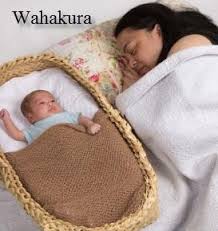 sleeping
pods and 1,500 woven flax wahakura distributed to new mothers
of all races, and with other incentives in those same years,
there was a huge drop in Maori infant mortality.
sleeping
pods and 1,500 woven flax wahakura distributed to new mothers
of all races, and with other incentives in those same years,
there was a huge drop in Maori infant mortality.
 sleeping
pods and 1,500 woven flax wahakura distributed to new mothers
of all races, and with other incentives in those same years,
there was a huge drop in Maori infant mortality.
sleeping
pods and 1,500 woven flax wahakura distributed to new mothers
of all races, and with other incentives in those same years,
there was a huge drop in Maori infant mortality.Smoking
Young working-class Maori
women often suffer greatly from stress, loneliness and
anxiety, and the nicotine in a cigarette or vape gadget
creates an immediate sense of relaxation, so many smoke or
vape in the belief it will reduce this suffering. But the
relaxed feeling is temporary and soon gives way to
withdrawal symptoms and increased cravings. Or a young
mother may be exposed to others smoking.
Animal tests have indicated that nicotine in the mother's blood may be a key chemical responsible for many long-term effects on her offspring, such as impaired fertility, diabetes, obesity, high blood pressure, behavioral problems and respiratory defects. NIH
Joining a kapa haka group could be the first step towards working off the stress and loneliness, by gaining a support network and practicing actions as an alternative activity for relaxation.
Even if you have no data left on your cellphone, you can still contact Quitline or other maternal and general healthcare services. Go to zero.govt.nz on your mobile phone and select 'Health New Zealand.
Animal tests have indicated that nicotine in the mother's blood may be a key chemical responsible for many long-term effects on her offspring, such as impaired fertility, diabetes, obesity, high blood pressure, behavioral problems and respiratory defects. NIH
Joining a kapa haka group could be the first step towards working off the stress and loneliness, by gaining a support network and practicing actions as an alternative activity for relaxation.
Even if you have no data left on your cellphone, you can still contact Quitline or other maternal and general healthcare services. Go to zero.govt.nz on your mobile phone and select 'Health New Zealand.
Alcohol
There is no known safe level
of alcohol use at any stage of pregnancy. This includes the
time around conception. It is best to stop drinking alcohol
when planning a pregnancy, or as soon as you know you are
pregnant.
Women who drink alcohol when pregnant are more likely to give birth to babies who are smaller, premature and have problems in their development, behavior or physical growth. Tewhatuora
Pēpē, pepe, pepi, pēpi
These are all modifications of
the English word 'baby.'
Pēpe is the word used in many other Polynesian countries.
Pepe and pepi were first used in Maori newspapers with this meaning in the 1870s. Before that time, the newspapers only used nga pepe to refer to silk worms and large tropical butterflies, and the word pepi did not exist.
Nga Nuipepa
Pēpe is the word used in many other Polynesian countries.
Pepe and pepi were first used in Maori newspapers with this meaning in the 1870s. Before that time, the newspapers only used nga pepe to refer to silk worms and large tropical butterflies, and the word pepi did not exist.
Nga Nuipepa
In classic Māori:
Ka pepe - to flutter. He pepe, a butterfly. origin PNG
Nohinohi - (adjective) small
- (noun)
a toddler
-
an unborn or newly-born baby.
Piri-poho - (adjective) keep close to - bosom, treasured.
See Pinepine Te Kura.
Taonga - this means weighed down, derived from the verb tao to weigh down. It referred to big, heavy treasures like a carving, a greenstone rock or ornament, or piles of kumara. Malaysia takep = to capture
You might like to call your treasured baby boy your kura until he is too heavy for you to carry easily.
Pēpē - (adjective) crushed.
- (noun) food for the
baby, chewed up in the mother's mouth.
Rangi, the tune's origin
"Aura Lea," is a song written by W Fosdick about a maid with
golden hair, to a tune composed by George Poulton. It was
published just before the 1860s American Civil War and sung
by troops on both sides, like all soldiers sang Lili Marlene
in WW2- with the New Zealanders enthusiastically adding E
pō e taitai e at the end!

Poulton's "Aura Lea" tune was
used for Elvis Presley's 1956 song "Love Me Tender," written
by Ken
Darby.
